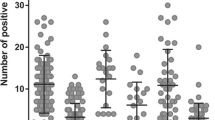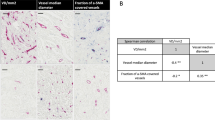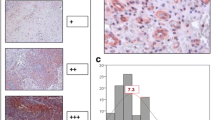Abstract
Background
Angiogenesis is an indispensable step in the growth and invasiveness of breast cancers involving a series of exquisite molecular steps. Pro-angiogenic factors, including vascular endothelial growth factor (VEGF), have been recognized as pivotal therapeutic targets in the treatment of breast cancer. More recently, a highly conserved transcription factor Twist has been reported to be involved in tumor angiogenesis and metastasis.
Methods
The expression of VEGF-C and Twist was immunohistochemically determined in tissue samples of primary tumors from 408 patients undergoing curative surgical resection for breast cancer. The correlations of VEGF-C and Twist expressions with clinicopathologic parameters as well as survival outcomes were evaluated.
Results
Of the 408 patients evaluated, approximately 70% had high expression of VEGF-C which was significantly associated with advanced tumor stages (P = 0.019). Similarly, VEGF-C expression was associated with the proliferation index Ki67, N3 lymph node metastasis, and D2-40-positive lymphatic vessel invasion (LVI) in a univariate analysis. Furthermore, patients with high expressions of VEGF-C and Twist (V + T+) had significantly increased lymph node metastasis, higher clinical stage, and worse disease-free survival, DFS (P = 0.001) and overall survival, OS (P = 0.011).
Conclusions
Our results suggested that co-expression of VEGF-C and Twist was associated with larger tumor size, higher numbers of lymph node involvement, D2-40-positive LVI, higher risk of distant metastasis, and worse DFS or OS in breast cancer patients.



Similar content being viewed by others
References
Ferlay J, Steliarova-Foucher E, Lortet-Tieulent J, Rosso S, Coebergh JW, Comber H, et al. Cancer incidence and mortality patterns in Europe: estimates for 40 countries in 2012. Eur J Cancer. 2013;49(6):1374–403.
Fan L, Strasser-Weippl K, Li JJ, St Louis J, Finkelstein DM, Yu KD, et al. Breast cancer in China. Lancet Oncol. 2014;15(7):e279–89.
Mirza NQ, Vlastos G, Meric F, Buchholz TA, Esnaola N, Singletary SE, et al. Predictors of locoregional recurrence among patients with early-stage breast cancer treated with breast-conserving therapy. Ann Surg Oncol. 2002;9(3):256–65.
Millar EK, Graham PH, O’Toole SA, McNeil CM, Browne L, Morey AL, et al. Prediction of local recurrence, distant metastases, and death after breast-conserving therapy in early-stage invasive breast cancer using a five-biomarker panel. J Clin Oncol. 2009;27(28):4701–8.
Alitalo K, Carmeliet P. Molecular mechanisms of lymphangiogenesis in health and disease. Cancer Cell. 2002;1(3):219–27.
Miao H, Ruan S, Shen M. VEGF-C in rectal cancer tissues promotes tumor invasion and metastasis. J BUON. 2018;23(1):42–7.
Selemetjev S, Savin S, Paunovic I, Tatic S, Cvejic D. Concomitant high expression of survivin and vascular endothelial growth factor-C is strongly associated with metastatic status of lymph nodes in papillary thyroid carcinoma. J Cancer Res Ther. 2018;14(Supplement):S114–9.
Giovannini M, Aldrighetti D, Zucchinelli P, Belli C, Villa E. Antiangiogenic strategies in breast cancer management. Crit Rev Oncol Hematol. 2010;76(1):13–35.
Mironchik Y, Winnard PT Jr, Vesuna F, Kato Y, Wildes F, et al. Twist overexpression induces in vivo angiogenesis and correlates with chromosomal instability in breast cancer. Can Res. 2005;65(23):10801–9.
Zhang YQ, Wei XL, Liang YK, Chen WL, Zhang F, Zhang GJ, et al. Over-expressed Twist associates with markers of epithelial mesenchymal transition and predicts poor prognosis in breast cancers via ERK and AKT activation. PLoS One. 2015;10(8):e0135851.
Niu RF, Zhang L, Xi GM, Wei XY, Yang Y, Shi YR, et al. Up-regulation of Twist induces angiogenesis and correlates with metastasis in hepatocellular carcinoma. J Exp Clin Cancer Res CR. 2007;26(3):385–94.
Lei P, Ding D, Xie J, Wang L, Liao Q, Hu Y. Expression profile of Twist, vascular endothelial growth factor and CD34 in patients with different phases of osteosarcoma. Oncol Lett. 2015;10(1):417–21.
Heimburg S, Oehler MK, Papadopoulos T, Caffier H, Kristen P, Dietl J. Prognostic relevance of the endothelial marker CD 34 in ovarian cancer. Anticancer Res. 1999;19(4A):2527–9.
Su JL, Shih JY, Yen ML, Jeng YM, Chang CC, Hsieh CY, et al. Cyclooxygenase-2 induces EP1- and HER-2/Neu-dependent vascular endothelial growth factor-C up-regulation: a novel mechanism of lymphangiogenesis in lung adenocarcinoma. Can Res. 2004;64(2):554–64.
Do SI, Kim JY, Kang SY, Lee JJ, Lee JE, Nam SJ, et al. Expression of TWIST1, snail, slug, and NF-kappaB and methylation of the TWIST1 promoter in mammary phyllodes tumor. Tumour Biol J Int Soc Oncodev Biol Med. 2013;34(1):445–53.
Dai X, Xiang L, Li T, Bai Z. Cancer hallmarks, biomarkers and breast cancer molecular subtypes. J Cancer. 2016;7(10):1281–94.
Bi MM, Shang B, Wang Z, Chen G. Expression of CXCR4 and VEGF-C is correlated with lymph node metastasis in non-small cell lung cancer. Thorac Cancer. 2017;8(6):634–41.
Vellinga TT, Kranenburg O, Frenkel N, Ubink I, Marvin D, Govaert K, et al. Lymphangiogenic gene expression is associated with lymph node recurrence and poor prognosis after partial hepatectomy for colorectal liver metastasis. Ann Surg. 2017;266(5):765–71.
Gunningham SP, Currie MJ, Han C, Robinson BA, Scott PA, Harris AL, et al. The short form of the alternatively spliced flt-4 but not its ligand vascular endothelial growth factor C is related to lymph node metastasis in human breast cancers. Clin Cancer Res. 2000;6(11):4278–86.
Hu L, Roth JM, Brooks P, Ibrahim S, Karpatkin S. Twist is required for thrombin-induced tumor angiogenesis and growth. Can Res. 2008;68(11):4296–302.
Banerjee A, Wu ZS, Qian PX, Kang J, Liu DX, Zhu T, et al. ARTEMIN promotes de novo angiogenesis in ER negative mammary carcinoma through activation of TWIST1-VEGF-A signalling. PLoS One. 2012;7(11):e50098.
Dvorak HF. Vascular permeability factor/vascular endothelial growth factor: a critical cytokine in tumor angiogenesis and a potential target for diagnosis and therapy. J Clin Oncol. 2002;20(21):4368–80.
Schirosi L, De Summa S, Tommasi S, Paradiso A, Gasparini G, Popescu O, et al. VEGF and TWIST1 in a 16-biomarker immunoprofile useful for prognosis of breast cancer patients. Int J Cancer. 2017;141(9):1901–11.
Funding
This study was funded by Natural Science Foundation Committee (No.81602345), Shantou science and technology program, China (No.123,2015), Science and Technology Planning Project of Guangdong Province, China (2016A020215145), Medical Scientific Research Foundation of Guangdong Province, China (A2016589) and Start-Up Funds from Xiamen University.
Author information
Authors and Affiliations
Corresponding authors
Ethics declarations
Conflict of interest
The authors have declared that no competing interests exist.
Ethical approval
The work was conducted in accordance with the Declaration of Helsinki. Written informed consents were obtained from all patients, in particular, for the use of human tissues, and the study protocol was approved by the medical ethics committee of the Cancer Hospital of Shantou University Medical College.
Informed consent
Informed consent is not required for this type of study.
Additional information
Publisher's Note
Springer Nature remains neutral with regard to jurisdictional claims in published maps and institutional affiliations.
Rights and permissions
About this article
Cite this article
Zhang, YQ., Chen, WL., Zhang, F. et al. Over-expression of both VEGF-C and Twist predicts poor prognosis in human breast cancer. Clin Transl Oncol 21, 1250–1259 (2019). https://doi.org/10.1007/s12094-019-02051-9
Received:
Accepted:
Published:
Issue Date:
DOI: https://doi.org/10.1007/s12094-019-02051-9




